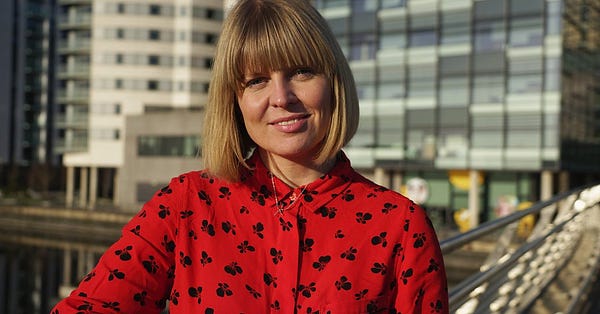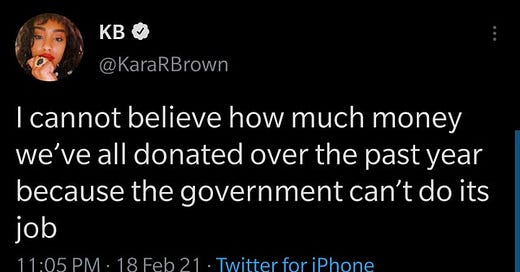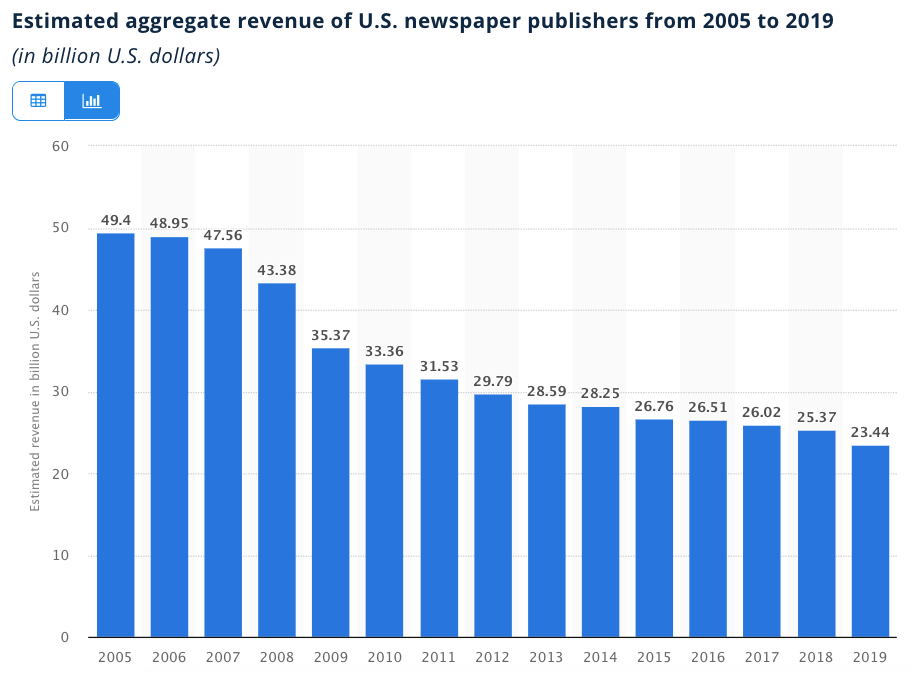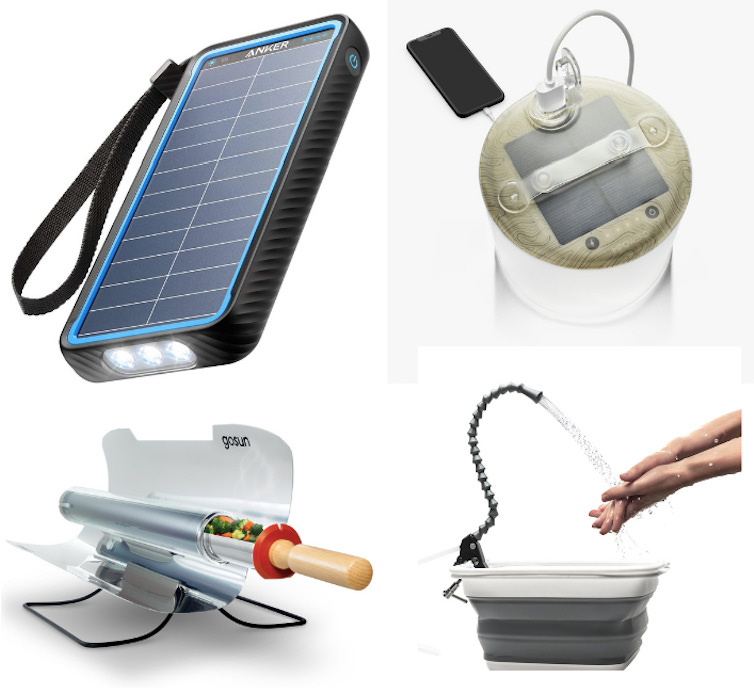The tech giants need to pay the news industry
What's happening in Australia with Google, Facebook, and publishers is a harbinger of things to come.
Sree’s newsletter is produced w/ Zach Peterson (@zachprague). The image above and the Texas disaster are reminders that governments have failed us in so many ways.
Scroll down for Read Something; Watch Something; a weekly tech tip from Robert S. Anthony (@newyorkbob), and much more.
TUNE IN: #NYTReadalong - Our guest this week is Elizabeth Becker, former New York Times Reporter and author of "You Don't Belong Here: How Three Women Rewrote the Story of War." Her book is coming out Tuesday, February 23.. Here’s executive producer Neil Parekh’s thread on the show.
My Digimentors team is working with companies and nonprofits around the world to create virtual and hybrid events. We’ve worked on events for 50 people and 100,000 people. See our new brochure. Don’t cancel or postpone your conference - contact us! sree@sree.net
***
Feb. 17, 2021, was a milestone day for the future of news. That day, Google and Facebook took divergent paths in response to a proposed Australian law seeking payment for news publishers. I’ll spare the details and point you to these solid rundowns (take your pick!) from the BBC, The Guardian, The New York Times, and The Washington Post, of what’s in the law—I prefer to discuss the matter more generally.
First and foremost, Google and Facebook should be paying news publishers some sort of “link royalty” every time someone shares a link on Facebook, or clicks on something via Google. In fact, they should have been doing this already - for years. It’s easy to get into a meta discussion on the importance of reliable news and information to society, but this starts with very simple dollars and cents.
Here’s Facebook’s revenue over the last 11 years:
Here’s Google’s (in billions) over the last 18 years:
And, here is combined revenue from newspaper publishers since 2005 (also, in billions):
While revenue growth at Google and Facebook certainly involves a lot of things other than news, the decline of newspaper revenue is very closely tied to the rise of The Platform as a way of getting information. The new law in Australia gets to the latter, to a degree. Google initially fought the proposed law but decided to strike deals with publishers last week. Facebook took a different route and banned news from the platform in Australia.
The fact is that news publishers probably need Google and Facebook more than Google and Facebook need news publishers. In mid-June 2020, when it was still fighting the Australian proposal, Google said that 1% of all searches in Australia were for news content. Facebook says—in its statement about banning news content in Australia, no less—the news makes up 4% of the content people see in their newsfeeds.
But, I don’t think we should equate volume with value, and the last thing Facebook needs is less quality content on its platform. Solid, reliable journalism takes resources to produce, and publishers have been bleeding money for years as advertising dollars have gone digital. It also took far too long for publishers to understand the value of subscriptions, and that was a painful lesson learned. But, for all the encouraging data about digital revenue at major news outlets like The New York Times and Washington Post, smaller news organizations are struggling, and local outlets and alt-weeklies have been, and are being, completely obliterated.
Is Australia’s new law going to work? It led to Google’s striking a deal already, so there’s some hope. The thing is, the amounts of money we’re talking about here—money that could fundamentally save the business of reporting the news—is peanuts to the likes of Google and Facebook (and Apple, for that matter).
I think every news outlet should get paid any time a person shares a link on Facebook, and the payout should increase on a rolling scale according to engagement/virality. There is, admittedly, no perfect way to do this, but it’s worth trying - for the sake of news publishers and consumers alike.
- Sree
Read Something
Predictably (and unfortunately), the lesson state-level Republicans have learned from the 2020 election is a familiar one for the party—they need to make voting more difficult any way they can. This report by Amy Gardner (@AmyEGardner) for The Washington Post is a good rundown of new proposed laws across the country that will only damage the democratic process further.


Tech tip: Solar Power to the Rescue? Maybe.
By Robert S. Anthony
Each week, veteran tech journalist Robert S. Anthony shares a tech tip you don’t want to miss. Follow him @newyorkbob.
“Don't it always seem to go that you don't know what you got 'til it's gone,” is from an eco-conscious Joni Mitchell song from 1970, but Texans hearing it today could be excused if they thought she meant power, water and heat.
As Texans recover from power outages and frozen water pipes caused by last week’s wicked cold snap, some may have looked to the heavens for help—and some may have found it: solar power.
While small solar-powered gadgets can’t light or heat an entire home like fuel-powered devices like generators, some can light a room, power mobile electronics, cook food or sanitize water—all of which can be helpful in time of crisis.
For example, last year GoSun introduced the GoSun Flow, a solar-powered water purifier that can clean water taken from a stream, melted snow or other source. The $199 package, which earned an innovation award at last month’s CES 2021 technology event, includes a small power bank, a replaceable water filter, a water pump and a solar panel. The $279 GoSun Flow Pro adds a sink and a flexible faucet/shower.
The company also offers the GoSun Sport, a $219 portable solar oven that can cook a hot meal for two in 20 minutes. Fold-out reflectors concentrate sunlight onto a long, narrow cylinder which can heat up to 550 degrees Fahrenheit, according to GoSun. The $319 GoSun Sport Pro Pack adds a kettle for boiling liquids, an extra cooking pan and baking cups.
The $40 Luci Pro Series inflatable solar light from MPowerd provides up to 50 hours of light per 14-hour solar charge of its 2,000 mAh battery and provides a USB port for charging cell phones and other devices. The lightweight, 5-inch-diameter cylinder unit collapses to a 1.5-inch package and inflates to five inches high.
The weather resistant $40 Anker PowerCore Solar 10000 power bank has enough capacity in its 10,000 mAh battery to recharge a dead iPhone 11 twice, according to Anker. The unit includes two USB ports for charging devices, a flashlight and can be charged with a standard phone charger as well as its solar panel. Anker notes, however, that charging the PowerCore Solar 10000 from empty to full with sunlight alone can take days.
Blackouts and dry faucets are never any fun, but the right tech can fill some of the void until life returns to normal.
Listen to Something
This was a HUGE week for exploration, culminating in the successful landing of the Perseverance rover on Mars. This episode of the BBC Inside Science podcast was recorded before touchdown, but it’s a great primer into the science and what we’re looking for on the red planet.


Watch Something
Data privacy is important enough, but with the increasingly-online lives of our children, data privacy is more important than ever. Veronica Barassi (@veronicabarassi), author of the brand-new "child | data | citizen: How Tech Companies Are Profiling Us From Before Birth," joined me this week to discuss.
Odds & Ends
🗞 TUNE IN: #NYTReadalong - Our guest this week is Elizabeth Becker, former New York Times Reporter and author of "You Don't Belong Here: How Three Women Rewrote the Story of War."
The Readalong is followed, on Sundays at 11 am-noon ET, by a new medical show I’m co-executive producing with surgeons Sujana Chandrasekhar, M.D. (@DrSujanaENT), and Marina Kurian, M.D. (@MarinaKurian), called She’s On Call (watch live or later).
After 250 episodes in 250 days, my global show has moved from daily episodes to 1-2 times a week. The best way to know when I’m on the air and see all my archived shows, is to subscribe to my YouTube channel or my Whatsapp alerts.
The Sunday #NYTReadalong is sponsored by Muck Rack. Interested in sponsorship opportunities? Email sree@digimentors.group and neil@digimentors.group.
🎧 Every Saturday, I host a call-in show on WBAI 99.5FM (@wbai) - "Coping with Covid19" - focused on being helpful, hopeful, and focusing on the pandemic's effects on society’s most vulnerable. Listen live Saturdays from 12-1pm ET, or later. And, of course, call in or tweet questions for us using the #wbaisree hashtag. Listen to a recent episode here!
👀 Did we miss anything? Make a mistake? Do you have an idea for anything we’re up to? Let us know! Let’s collaborate!









